
Operation Flashpoint: Dragon Rising is a tactical shooter video game for Microsoft Windows, PlayStation 3 and Xbox 360 developed and published by Codemasters. Codemasters has advertised the game as a tactical shooter designed to represent modern infantry combat realistically. It is a stand-alone sequel to Bohemia Interactive's Operation Flashpoint: Cold War Crisis, but was developed entirely by Codemasters due to a falling-out between the two companies.
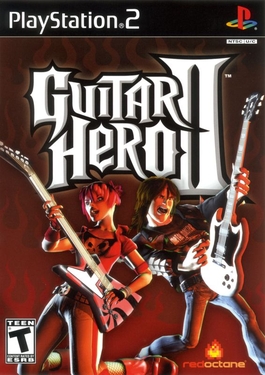
Guitar Hero II is a music rhythm video game developed by Harmonix and published by RedOctane for the PlayStation 2 and Activision for the Xbox 360. It is the second main installment in the Guitar Hero series and is the sequel to 2005's Guitar Hero. It was first released for the PlayStation 2 in November 2006, and then for the Xbox 360 in April 2007, with additional content not originally in the PlayStation 2 version.

Uno is a video game based on the card game of the same name. It has been released for a number of platforms. The Xbox 360 version by Carbonated Games and Microsoft Game Studios was released on May 9, 2006, as a digital download via Xbox Live Arcade. A version for iPhone OS and iPod devices was released in 2008 by Gameloft. Gameloft released the PlayStation 3 version on October 1, 2009, and also released a version for WiiWare, Nintendo DSi via DSiWare, and PlayStation Portable. An updated version developed by Ubisoft Chengdu and published by Ubisoft was released for the PlayStation 4 and Xbox One in August 2016, Microsoft Windows in December 2016 and for the Nintendo Switch in November 2017.
Guitar Hero is a series of music rhythm game video games first released in 2005, in which players use a guitar-shaped game controller to simulate playing primarily lead, bass guitar, and rhythm guitar across numerous songs. Players match notes that scroll on-screen to colored fret buttons on the controller, strumming the controller in time to the music in order to score points, and keep the virtual audience excited. The games attempt to mimic many features of playing a real guitar, including the use of fast-fingering hammer-ons and pull-offs and the use of the whammy bar to alter the pitch of notes. Most games support single player modes, typically a Career mode to play through all the songs in the game, as well as competitive and cooperative multiplayer modes. With the introduction of Guitar Hero World Tour in 2008, the game includes support for a four-player band including vocals and drums. The series initially used mostly cover versions of songs created by WaveGroup Sound, but most recent titles feature soundtracks that are fully master recordings, and in some cases, special re-recordings, of the songs. Later titles in the series feature support for downloadable content in the form of new songs.
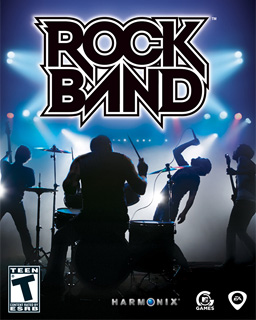
Rock Band is a music video game developed by Harmonix, published by MTV Games and distributed by Electronic Arts. It is the first title in the Rock Band series. The Xbox 360 and PlayStation 3 versions were released in North America on November 20, 2007, while the PlayStation 2 version was released on December 18, 2007 and the Wii version on June 22, 2008. Harmonix previously developed the first two games in the Guitar Hero series, which popularized gameplay of rock music with guitar-shaped controllers. After development of the series was shifted to Neversoft, Harmonix conceived Rock Band as a new title that would offer multi-instrument gameplay.
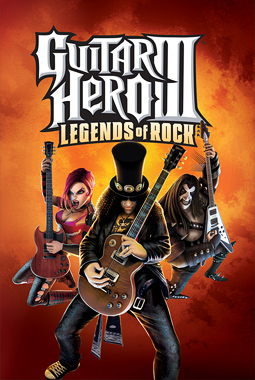
Guitar Hero III: Legends of Rock is a music rhythm video game developed by Neversoft and published by Activision. It is the third main installment in the Guitar Hero series, following Guitar Hero II. It is the first game in the series to be developed by Neversoft after Activision's acquisition of RedOctane and MTV Games' purchase of Harmonix, the previous development studio for the series. The game was released worldwide for the PlayStation 2, PlayStation 3, Wii and Xbox 360 in October 2007, with Budcat Creations assisting Neversoft on developing the PlayStation 2 port and Vicarious Visions solely developing on the Wii port respectively. Aspyr published the Microsoft Windows and Mac OS X versions of the game, releasing them later in 2007.

Guitar Hero World Tour is a 2008 music rhythm video game developed by Neversoft and published by Activision. It is the fourth main installment in the Guitar Hero series. The game was launched in North America in October 2008 for the PlayStation 2, PlayStation 3, Wii, and Xbox 360 consoles, and a month later for Europe and Australia. A version of World Tour for Microsoft Windows and Mac OS X was later released by Aspyr.
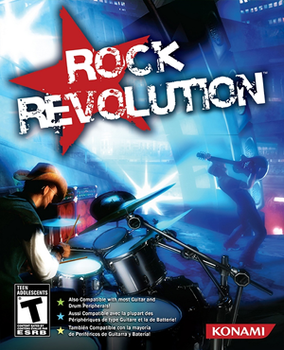
Rock Revolution is a music video game developed by Zoë Mode and HB Studios and published by Konami. The game was released on 15 October 2008 for the Nintendo DS, PlayStation 3, Wii and Xbox 360. As with similar titles, the game uses various controllers to simulate the performance of rock music, primarily using guitar and drum controllers on its Xbox 360 and PlayStation 3 versions.

Rock Band 2 is a 2008 music video game developed by Harmonix, published by MTV Games and distributed by Electronic Arts. It is the sequel to Rock Band and is the second title in the series. The game allows up to four players to simulate the performance of popular songs by playing with controllers modeled after musical instruments. Players can play the lead guitar, bass guitar, and drums parts to songs with "instrument controllers", as well as sing through a USB microphone. Players are scored on their ability to match scrolling musical "notes" while playing instruments, or by their ability to match the singer's pitch on vocals.

Guitar Hero: Metallica is a 2009 music rhythm video game developed by Neversoft and published by Activision. The game was released in North America on the PlayStation 3, Wii, and Xbox 360 on March 29, 2009, and on PlayStation 2 on April 14, 2009, with an Australian and European release in May 2009. It is the first game in the Guitar Hero series to focus on the career and songs of heavy metal band, Metallica, following Guitar Hero: Aerosmith.

Lego Rock Band is a music rhythm game developed by TT Fusion in partnership with Harmonix and published by Warner Bros. Interactive Entertainment. It is the 4th major console installment of the Rock Band series; it incorporates elements from Lego video games. The game was released on 3 November 2009 for Xbox 360, PlayStation 3, and Wii home consoles in the United States. A Nintendo DS version was also developed in conjunction with Backbone Entertainment.

Rock Band 3 is a 2010 music video game developed by Harmonix. The game was initially published and distributed by MTV Games and Electronic Arts, respectively, in late October 2010. Mad Catz took over both roles and re-released the title on November 23, 2011. It is the third main game and the 6th major console installment in the Rock Band series. As with the previous titles, Rock Band 3 allows players to simulate the playing of rock music and many other subgenres using special instrument controllers mimicking lead and bass guitar, keyboard, drums, and vocals. Rock Band 3 expands upon previous games by including three-part vocal harmonies — previously used in The Beatles: Rock Band and Green Day: Rock Band — plus support for MIDI-compatible keyboards, electronic drumkits, and even use of a real guitar in "Pro" mode.

Power Gig: Rise of the SixString is a rhythm game developed and published by Seven45 Studios, a subsidiary of musical instrument manufacturer First Act. Unveiled at the 2010 Game Developers Conference, it was released for PlayStation 3 and Xbox 360 on October 19, 2010.
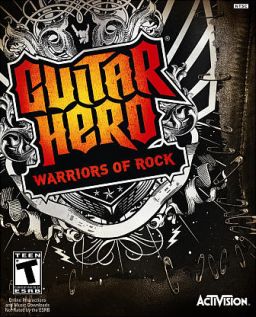
Guitar Hero: Warriors of Rock is a 2010 music rhythm video game developed by Neversoft and published by Activision. The sixth main installment in the Guitar Hero series following Guitar Hero 5. The game was released in September 2010 for PlayStation 3, Wii, and Xbox 360. Similar to previous entries in the franchise, it is geared towards playing in a four-person band experience, including lead and bass guitar, drums, and vocals. The game is available as a standalone title, allowing players to use existing compatible instrument controllers, and as a bundle that provides these controllers.
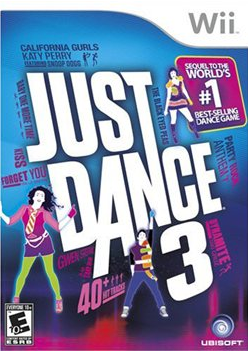
Just Dance 3 is a 2011 dance rhythm game released on the Wii, Xbox 360, and PlayStation 3 with Kinect and Move support respectively for the latter two. It is part of the Just Dance video game series published by Ubisoft originally on the Wii and the third main installment of the series. Just Dance 3 was announced shortly after the release of Just Dance 2 and was released for the Wii and Xbox 360 on October 7, 2011 in North America and October 11, 2011 in Australia and Europe and for the PlayStation 3 on December 6, 2011 in North America, December 8, 2011 in Australia and December 9, 2011 in Europe. Just Dance 3 received positive reviews from critics and is the best-selling third-party Wii game of all-time, with sales of 9.92 million.
Call of Juarez is a first-person shooter video game series created by Paweł Selinger in 2006. Released primarily on Microsoft Windows, PlayStation 3, and Xbox 360, there are four games in the series; Call of Juarez (2006), Call of Juarez: Bound in Blood (2009), Call of Juarez: The Cartel (2011), and Call of Juarez: Gunslinger (2013). Techland has developed all four games, and as of 2018, owns the publishing rights. From 2006 to 2018, Ubisoft held the publishing rights.

Rayman Legends is a platform video game developed by Ubisoft Montpellier and published by Ubisoft. It is the fifth main title in the Rayman series and the direct sequel to the 2011 game Rayman Origins. The game was released for Microsoft Windows, PlayStation 3, Xbox 360, Wii U, and PlayStation Vita platforms in August and September 2013. PlayStation 4 and Xbox One versions were released in February 2014, with a Stadia version released in November 2021. A Nintendo Switch port, titled Rayman Legends Definitive Edition, was released in North America, Europe and Australia on September 12, 2017.

Rocksmith 2014 is a music video game produced by Ubisoft. It is a followup to the 2011 game Rocksmith, but has been described as a replacement to the original game rather than a sequel. Like its predecessor, the game allows players to plug in virtually any electric guitar or bass guitar and play along via the use of a USB adapter – removing the need for any proprietary controller like other music games such as Guitar Hero. The game comes with 66 songs on disk, with over a thousand more available to download as paid DLC. It was announced at Ubisoft's 2013 E3 presentation and was released for PlayStation 3, Xbox 360 and PC/Mac in October 2013, with versions for PlayStation 4 and Xbox One releasing in November 2014.

Rocksmith+ is a subscription-based music education service from Ubisoft focused on learning guitar and bass. It was released September 6, 2022 on PC and June 9, 2023 on Android and iOS and follows Rocksmith 2014.

















